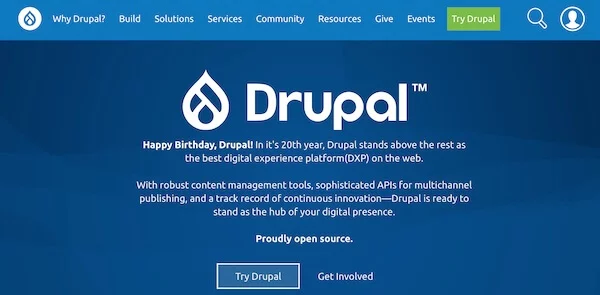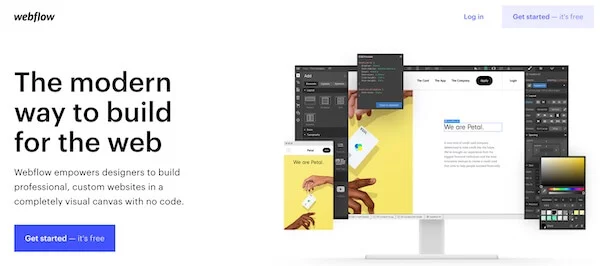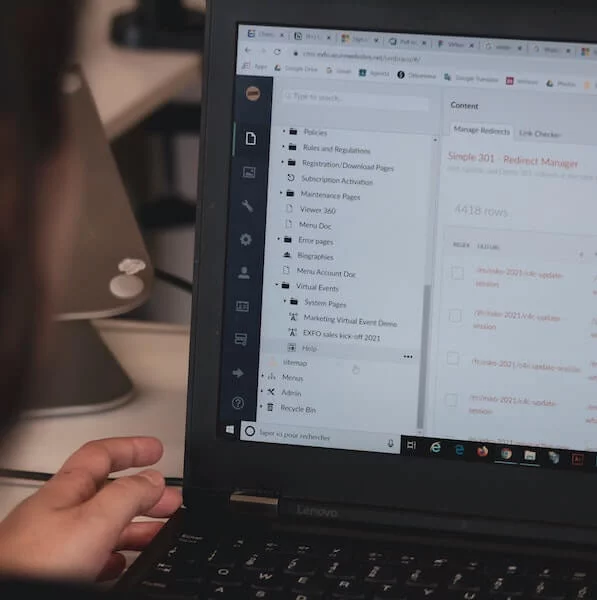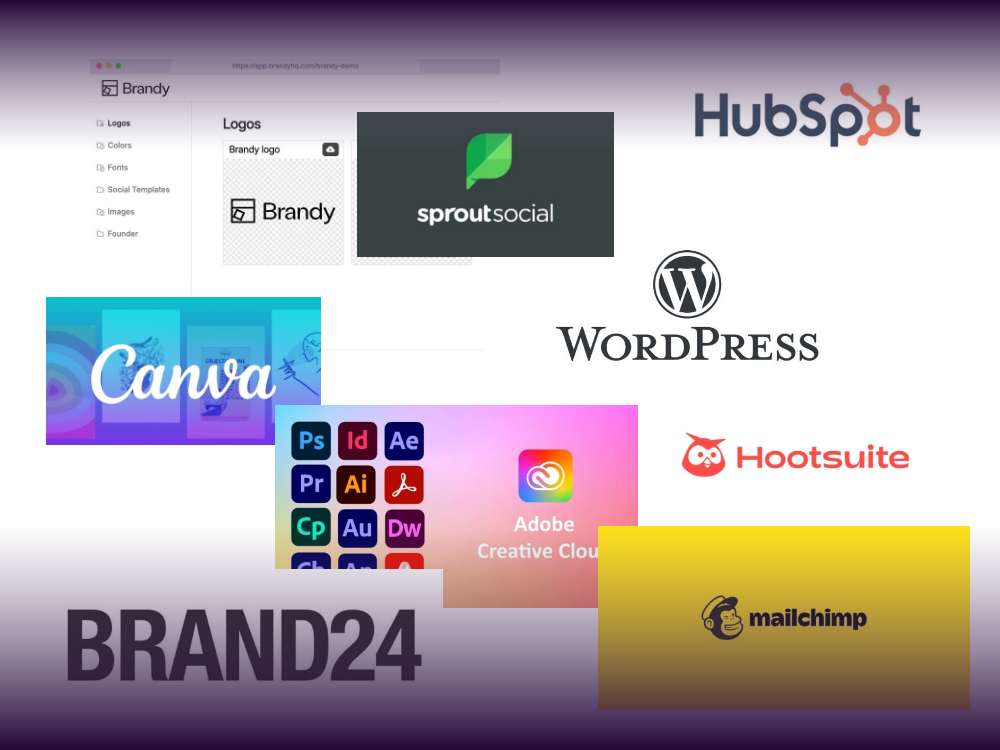Table of contents
Web design with WordPress is popular. Let’s not kid ourselves about that. But just because it’s popular doesn’t mean it’s the best option for professional web designers to do their work.
But we at GREYD are exactly of this opinion. The opinion that WordPress is currently (and probably in the future) the best content management system for web designers.
Don’t you think so?
Then you should read this article. Afterwards, you can still disagree with us.
The advantages: Why WordPress is a good CMS for web design
There is far more than one point in favor of WordPress as the content management system for professional web designers par excellence.
Here is a list of what we consider to be the most important benefits:
- The legendary evolution of WP
In terms of market share of all CMS systems, no other CMS is as popular as WordPress. The open-source program has slowly but surely fought its way to the top, is still growing, and is enjoying ever-increasing popularity.
As a WordPress web designer, it’s a home run for you when your clients already know they want a WordPress site even before they contact you. - The Gutenberg Editor
Yes, we admit it. At GREYD, we’re big fans of the Gutenberg Editor – so we design our product around it. Once you understand how to work with it, it’s hard to get away from it.
In the near future, thanks to WordPress’ own editor, it will be so much easier to design your clients’ websites that other content management systems will have to warm up. Not that the competition can keep up at this point. - The huge community
There is probably no other content management system that has such a large and helpful community as WordPress.
For every known problem there is a solution and not only within the WP Forum. Numerous blogs (like ours) and YouTube channels are dedicated to the CMS with the blue logo and enlighten users, from laymen to experts, with helpful information.
TYPO3 or Drupal also have a solid fan base. However, they can’t compete with the vast amount of shared knowledge of the WordPress community by any stretch of the imagination. - The choice of plugins and themes
It is only logical that the content management system with the most users also offers the largest selection of plugins and themes.
From page builder plugins and management and monitoring tools to contact form plugins and anti-spam plugins. WordPress leaves nothing to be desired. If a particular plugin doesn’t suit you, there are dozens of other alternatives for the same problem.
You can perfectionize the work for your customers with premium plugins. These plugins are not free of charge, but they bring you as a web designer much more advantages (more on this below). - Everything in your hands
Since you or your WordPress customer usually take care of the hosting yourself, everything stays with you. You have access to all files, such as images or videos, which are published on the website and are located on your server.
Unfortunately, this is not the case with some other CMSs that automatically host the websites for you. This is perhaps a relief for beginners who don’t want to hassle with web hosting. However, it’s a thorn in the side for service providers who want to make a living out of it and retain more control.
Of course, there are quite a few more advantages that WordPress offers web designers for their work. But this list already shows quite clearly why no other CMS can keep up with WordPress for web design.
Sure, there are a few individual points where this or that CMS shines more than good old WordPress. But on the whole, they do not come close to the power of WP.
This brings us directly to the next point, which is about the competition. Maybe you will find a system that turns out to be a better web designer CMS.
Alternative web design CMS
You know now what all speaks FOR WordPress. But you can’t make an omelet without breaking eggs and even in the world of WordPress not everything is rosy.
After all, there are enough professional designers who confidently do without WP and prefer to use other content management systems.
So let’s take a quick look at the best CMS programs in the web design CMS market.
Joomla!

With a market share of 3.5%, Joomla! (yes, the exclamation mark belongs to it) is in 3rd place among content management systems. 2nd place would be Shopify, which is not discussed here because it is “only” a store system. This makes Joomla!, purely by market share of content management systems, the best CMS after WordPress.
Joomla! is also an open source system, which is a plus point for beginners due to the saved fees. But that’s it with the advantages for laymen. Because unlike WordPress, Joomla! doesn’t make it quite as easy for you to build your own website without technical understanding.
Please do not misunderstand, a basic level of technical know-how is also necessary for WordPress. Only this is just more beautifully prepared and more pleasant to use.
The smaller WordPress competitor has much more to offer in the basic version. If you often build very large and extensive websites for your customers, this can prove to be an advantage.
On the other hand, there are nowhere near as many plugins or themes with design suggestions. So you are again more limited within the program.
All in all, Joomla! is definitely not the worst choice to implement good work for your clients as a web designer, as long as technical challenges don’t scare you away. In the long term, however, we would not advise you to do so, given the developments on the CMS market.
Drupal

Drupal is also an open source content management system. In terms of CMS market share, Drupal reaches 4th place.
It’s widely known among web nerds that Drupal has a much steeper learning curve than WordPress. The community is also smaller, but it feels a little more cohesive, which is often the case with small communities.
In terms of cyber security, Drupal definitely makes a good showing. Not many popular CMSs can meet such a high security standard as Drupal does.
Since Drupal requires a lot of technical understanding to be fully exploited, it is a no-go for classic designers. Designers are more artistically inclined and don’t want to have to delve too deeply into the matter when there is already another good CMS that is easier to use.
TYPO3

Is TYPO3 still up to date?
For fans of the CMS, the question may seem a bit ridiculous. But in percentage terms, TYPO3 is steadily losing market share. That points to a clear “no” to answer the question.
Of course, the CMS is not really bad. The open source system is especially popular for enterprise solutions, i.e. large portals and webshops (for example, Der Spiegel, SIXT or Infineon).
These massive projects actually always involve entire teams of developers with deep technical understanding who have no problems in the TYPO3 environment.
For web designers who want to implement the websites of small and medium-sized companies as quickly as possible, the content management system is then rather suboptimal.
Webflow

In terms of market share, Webflow is far from being able to keep up with the other solutions mentioned (although its use has increased dramatically in recent years).In addition, the Webflow CMS is not an open source program and only allows you to manage your content from the “CMS Plan” onwards – which is why, strictly speaking, it cannot be called a CMS out of the box.But web designers rave about Webflow for a reason.Because here, practically zero technical knowledge is required to create stunning websites for your customers. You don’t even have to worry about hosting with Webflow.Strictly speaking, one would have to compare Webflow with WIX rather than with the aforementioned open-source CMS. The target group is very similar and the technical possibilities within the systems are also very limited.Headless CMS and Flat File CMSLately there is a lot of talk in online forums and groups about so called “Headless CMS” and “Flat File CMS”.On a technical level, these content management systems offer far more advantages than most of the previously mentioned systems. They have a much leaner design and are therefore also ahead in terms of pagespeed.By the way, there are even some headless projects for WordPress on Github.As a full-blooded web designer, these CMS are probably not for you. With these systems, you have to deal with much more than just the pretty design of the website.What should a quality CMS for web designers cost?Honestly, that’s the wrong question. As a professional web designer, the content management system is one of your tools. You shouldn’t save money in the wrong place.Regarding WordPress, you don’t have to worry anyway, because it’s absolutely free. Only for hosting there are fees, which should be paid by your web design clients, because it’s their website after all.Much more important for you should be the tools with which you work with WordPress. And there are endless plugins that make the heart of every web designer beat faster with their paid models.We’ve already covered in numerous other articles why you’d better not rely on page builder plugins in the future. Even if they still offer a lot of features for building beautiful websites at the moment, it probably won’t last forever.GREYD.SUITE, on the other hand, offers you everything you need as a web designer or agency to offer your clients absolute premium websites.
Is your curiosity piqued for more?
Check out the free trial version of our GREYD.SUITE for WordPress. Then you will quickly realize why many web designers like to work with it.
As mentioned earlier, it would be wrong to be too stingy here. Our GREYD.SUITE, for example, seems a bit expensive to many service providers at first glance. But only until you have calculated how much other plugin costs you save with it.
Compare it with a craftsman. If you are planning a major renovation at home and the craftsman you hire only uses poor or cheap tools, it will not make a good impression.
Much worse, however, is that a poor end result is inevitable.
If, on the other hand, the craftsman uses high-quality tools, you can expect a good job.
In web design it’s no different, especially since it’s also a craft in its own right. The better your equipment, the better and faster you can do your job.
As a web designer or online agency, you have the great advantage that your tools (the software) do not wear out and you therefore save costs in the long run.
In our experience, the cost of software tools for web designers is about 300$ Euro per year to build decent websites (see chart above).
Conclusion
What is the best CMS for web designers?
After reading this article, you should be able to answer this question yourself. In any case, we still believe that WordPress is the best CMS software for web designers.
WordPress is the most popular CMS for a reason – and not only among web designers. The endless possibilities have made it easier for professional agencies to do a good job.
You shouldn’t save money in the wrong places when it comes to tools for your work. Good tools, such as themes or plugins, not only save you time, but also improve your results.
The alternative CMS usually require too much technical understanding to implement or are simply too bulky to use. As a designer, you won’t have much fun with them.






